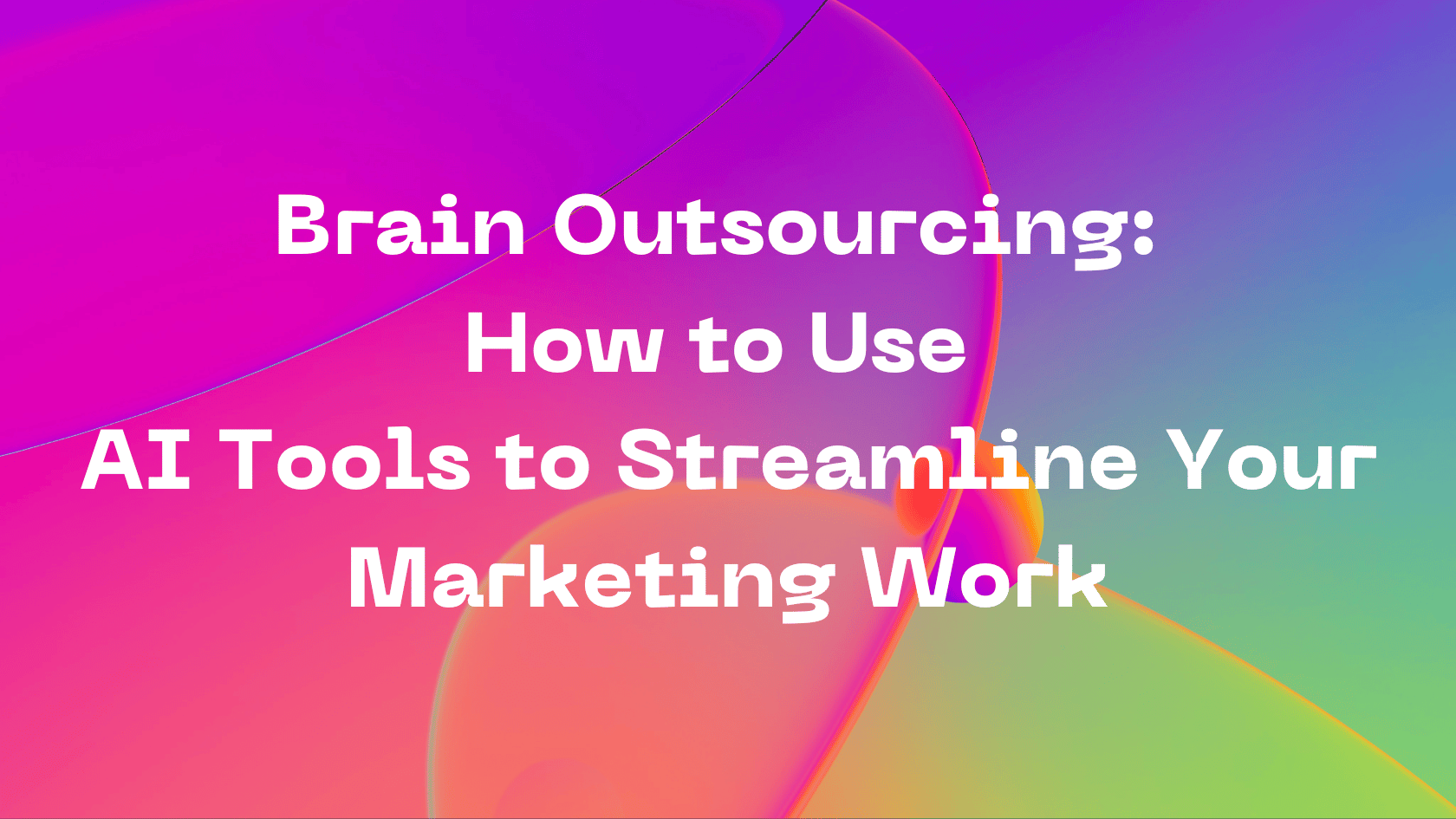
Are you tired of dragging your feet through the mud of marketing workflows? Look no further than marketing automation! Thanks to the power of AI, businesses are revolutionizing their marketing processes and seeing remarkable results. With lightning-fast speed and unbeatable accuracy, AI tools give companies the power to maximize their sales potential with ease.
So what’s the deal with marketing automation? We’re diving headfirst into this incredible world to analyze the differences between AI-driven and manual automation. Trust us, you won’t want to miss out on the amazing benefits that come with utilizing AI-driven marketing.
Brain outsourcing is the name of the game, folks. By streamlining your marketing work with AI tools, you’ll be able to focus on what really matters: growing your business. So let’s get started and explore the exciting world of marketing automation!
Introduction to Brain Outsourcing
As this revolutionary technology continues to gain traction, it’s no wonder the concept of brain outsourcing is quickly becoming a topic of conversation. It is undeniable that this technology has the capability of changing our lives in a major way – the potential is limitless!
Yet, along with this miraculous opportunity comes a bundle of ethical and moral responsibilities which are necessary to be addressed, understood and addressed.
Those who are in favor of this potential advancement are of the opinion that this technology could help expand our cognitive abilities and enrich our quality of life. But those opposed state that it could potentially cause a homogenization of our individual identities and cause us to lose our autonomy.
Therefore, as we continue our exploration of brain outsourcing, it is of utmost importance that all implications are thoroughly examined and that this technology is used in a manner that is respectful to humanity’s ethical boundaries.
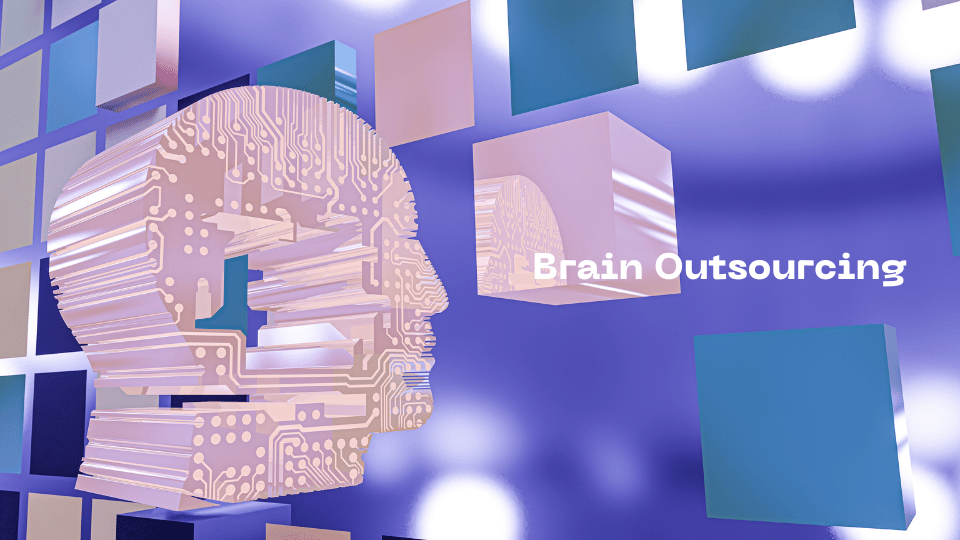
Benefits of Brain Outsourcing for Streamlining Your Marketing Work
As the marketing landscape continues to evolve, many professionals are quickly turning to brain outsourcing to stay ahead of the game. By offloading certain cognitive functions to machines or AI systems, marketers are able to focus their time and energy on the creative, strategic, and result-driven tasks that can make a real impact — while leaving mundane, time-consuming tasks to technology.
Not only does this simplify their workflow and make them more efficient, but it also allows them to utilize real-time data and insights to inform decisions and adjust strategies as needed.
For those with reservations about this kind of technology, the advantages of brain outsourcing in the marketing realm are undeniable. Leverage this technology, and you’ll be sure to exceed even your highest expectations and provide exceptional services and results for your clients.
Types of AI Tools and Technologies Used
AI is an exhilarating field of technology that’s advancing at a rapid pace, offering innovative tools to help developers create and deploy AI systems.
Whether it’s machine learning, which trains algorithms to learn from data and become smarter over time, natural language processing for understanding human language, computer vision to interpret visual data or any of the other myriad of AI frameworks and libraries available – like TensorFlow and PyTorch – to accelerate development; there are countless possibilities for AI development.
Cloud-based platforms such as Amazon Web Services and Microsoft Azure provide an opportunity to deploy AI applications with ease. The sky’s the limit for this groundbreaking technology!
AI has gone from strength to strength, and the future looks ever more promising.
How to Create a System for Brain Outsourcing
Creating a system for brain outsourcing can be a complex process, but there are several key steps that can help ensure success.
The first step is to identify the specific cognitive functions that can be outsourced to machines or artificial intelligence systems. This may involve analyzing current workflows and identifying areas where technology can be leveraged to improve efficiency.
Once these functions have been identified, it is important to select the appropriate tools and technologies to support them. This may involve researching different AI frameworks, libraries, and platforms to determine which ones are best suited to the specific needs of the organization.
Next, it is important to establish clear processes and protocols for integrating these tools into existing workflows. This may involve training staff on how to use new tools and technologies, as well as developing new standard operating procedures to ensure that the new system is integrated seamlessly into existing workflows.
Finally, it is important to continually monitor and evaluate the effectiveness of the new system, making adjustments and improvements as needed.
By following these steps and taking a thoughtful, strategic approach to brain outsourcing, organizations can unlock the full potential of this exciting technology.
AI Tools for Automated Content Creation
Artificial intelligence (AI) tools are revolutionizing the way content is created, making it faster, more efficient, and more personalized than ever before.
One of the most exciting applications of AI in content creation is automated content generation. With the help of AI tools like GPT-3 and NLG, content can be generated automatically based on specific parameters, such as topic, tone, and audience. This not only saves time and resources but can also improve the quality of content by ensuring that it is optimized for specific audiences and channels.
In addition to automated content generation, AI tools can also be used to optimize existing content. For example, tools like SEO.ai and Jasper use AI to analyze content and provide insights on how to improve it for better search engine optimization (SEO) and engagement.
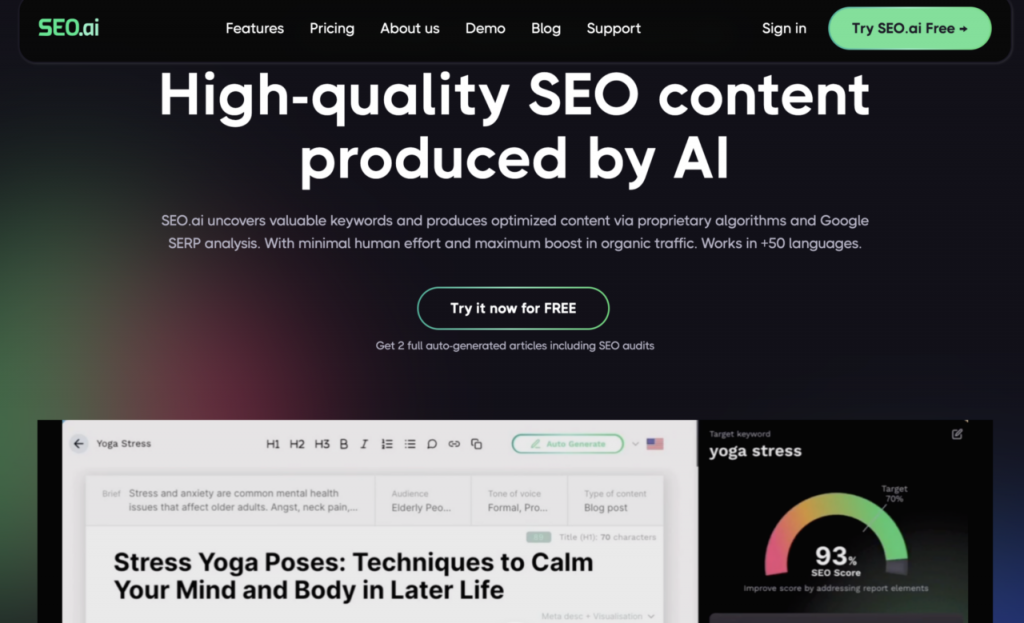
Driving organic traffic is essential for successful digital marketing. SEO.ai is an innovative AI tool that automates SEO-enhanced content creation. Similar to SurferSEO, SEO.ai provides an SEO score for your content, ensuring that it meets the best practices for search engine optimization.
SEO.ai offers insights and recommendations for both on-page and off-page SEO factors. It analyzes backlinks, social signals, and other external factors that influence search engine rankings. The tool also enables marketers to conduct in-depth keyword research effortlessly, suggesting relevant keywords based on search volume, competition, and relevance.
By leveraging SEO.ai, marketers can target the right audience and optimize their content for specific search queries. This increases the likelihood of attracting organic traffic and improving search engine rankings. With its AI assistance, SEO.ai streamlines the content creation process and helps marketers achieve better SEO results.
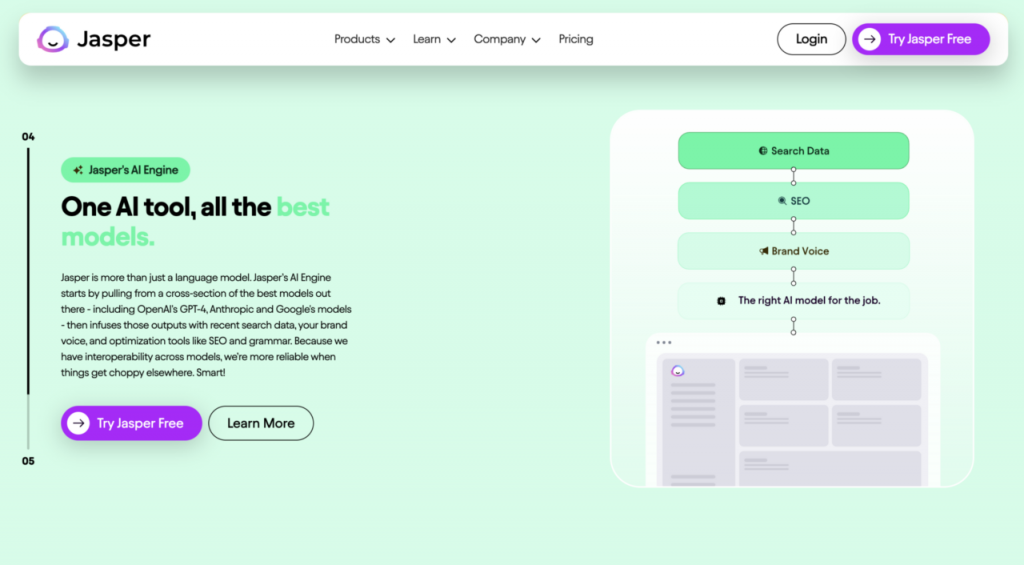
Jasper is an AI-powered tool that simplifies the content creation process with its user-friendly design. Whether you’re a seasoned marketer or a beginner, you’ll find the platform easy to navigate and utilize effectively. The tool’s intuitive interface guides you through the content creation process, making it accessible to users with varying levels of technical expertise.
Jasper leverages OpenAI’s GPT-3 technology to generate high-quality content. The tool analyzes your input and provides content suggestions that align with your objectives, ensuring that your messaging is clear, compelling, and relevant. With Jasper, you can save valuable time and effort by relying on AI to generate impactful content in a fraction of the time.
The tool’s AI capabilities continue to evolve, thanks to ongoing advancements in natural language processing and machine learning. As the algorithms become more sophisticated, marketers can expect even better results in terms of content quality and effectiveness. Jasper is a valuable asset for marketers seeking efficient and effective content creation solutions.
Finally, AI tools can also be used to personalize content for individual users, creating a more engaging and relevant experience. With the help of AI, content creators can take their work to the next level, delivering high-quality content that resonates with audiences and drives results.
AI Tools for Social Media Management
Gregarious social media managers know that managing their accounts can be an immense undertaking – but AI tools have made this a lot easier. From automated content scheduling to optimizing posts for targeted audiences, AI tools have significantly transformed how businesses manage their accounts and maximize their reach.
Consider Sprout Social – a tool that makes scheduling content a cinch, giving social media managers more flexibility and the opportunity to explore other areas. Furthermore, AdCreative.ai employs AI to provide deep insights so you can always be sure to make the most of your social media output.
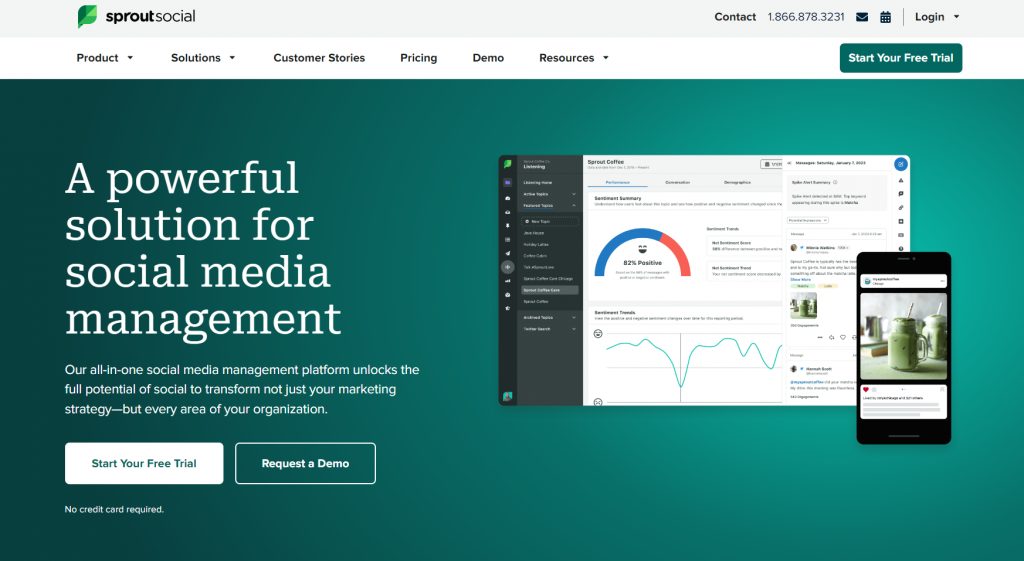
Sprout Social is a powerful social media management platform – and every savvy marketer knows it. With powerful tools to schedule, analyze and publish content, as well as state-of-the-art social listening and engagement features, this latest offering from Sprout Social is sure to take your business to the next level.
Here’s what you can learn from the Sprout Social platform: the incredible array of tools that let you manage multiple social media accounts, keep tabs on what’s being said about your brand, generate leads, and engage with customers. Plus, the vibrant analytics and reporting features provide valuable insights to help businesses optimize their social media strategy.
In short, Sprout Social is perfect for anyone who’s looking to add an extra spark to their brand. So if you’re ready to shape the future of your business, it’s time to give Sprout Social a try!
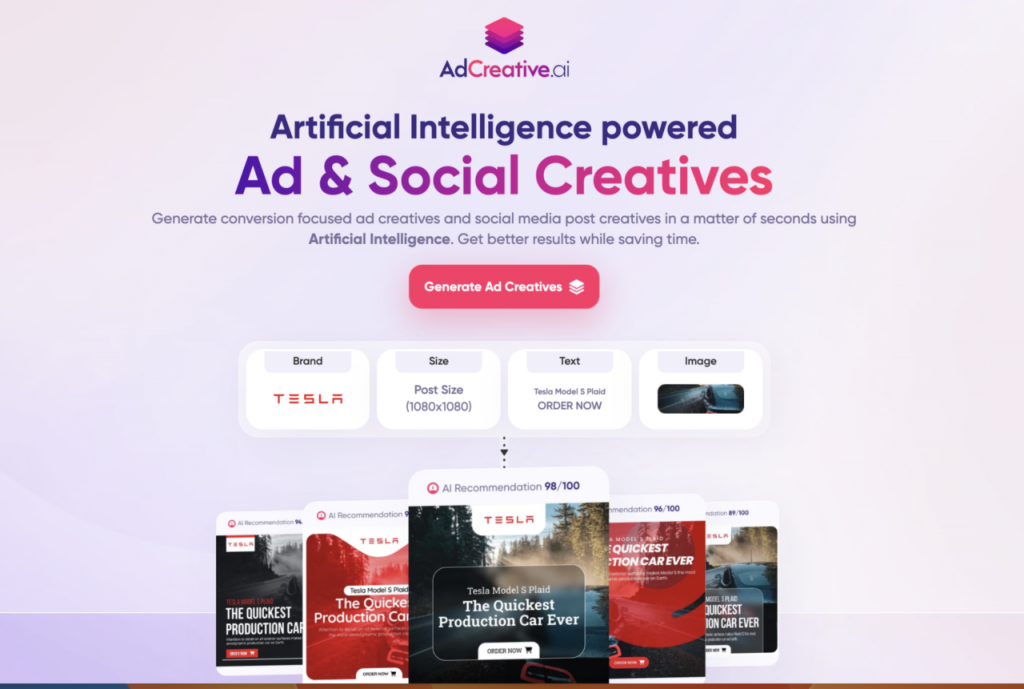
Crafting compelling and visually appealing ads is vital for capturing your audience’s attention. AdCreative.ai is an AI-powered ad and social creative tool that simplifies the ad creation process. With its machine-learning model, the tool generates stunning ads with the sole purpose of driving conversions.
AdCreative.ai offers a wide range of pre-designed ad templates that cover various industries and formats. These templates serve as a starting point, providing a foundation for marketers to customize and tailor their ad creatives to align with their brand identity and campaign objectives. Brands like Under Armor and Tesla have already benefited from this tool, creating eye-catching creatives that drive engagement and conversions.
With AdCreative.ai, marketers can streamline their ad creation process and deliver impactful campaigns without investing excessive time or resources. The tool’s AI-powered capabilities continue to learn and improve, ensuring that your ads stay up-to-date and effective in a rapidly changing digital landscape.
And if that weren’t enough, AI tools also aid in monitoring accounts by checking for customer inquiries and feedback in real-time – so you can stay in the know about what your audiences are saying! All in all, social media managers can leverage AI to simplify and expedite the workflow and create dynamite results for their businesses.
AI Tools for Analysis and Insights
In an increasingly data-driven world, staying ahead of the curve is essential. That’s why modern organizations turn to innovative Artificial Intelligence (AI) tools to extract valuable insights from various forms of data. These AI-driven analytics tools provide a cutting-edge way to analyze complex information and glean new knowledge; giving organizations a leg-up on their competition and enabling them to make informed decisions with confidence.
Natural Language Processing (NLP) tools enable the analysis of unstructured text data, such as customer reviews, social media posts, and survey responses. They can extract sentiments, identify key topics, perform text classification, and even generate human-like text.
Whether you’re a business owner, marketer, researcher, or analyst, AI-powered analysis tools can help you make data-driven decisions and gain a competitive edge. Here are a few notable AI tools for analysis and insights:
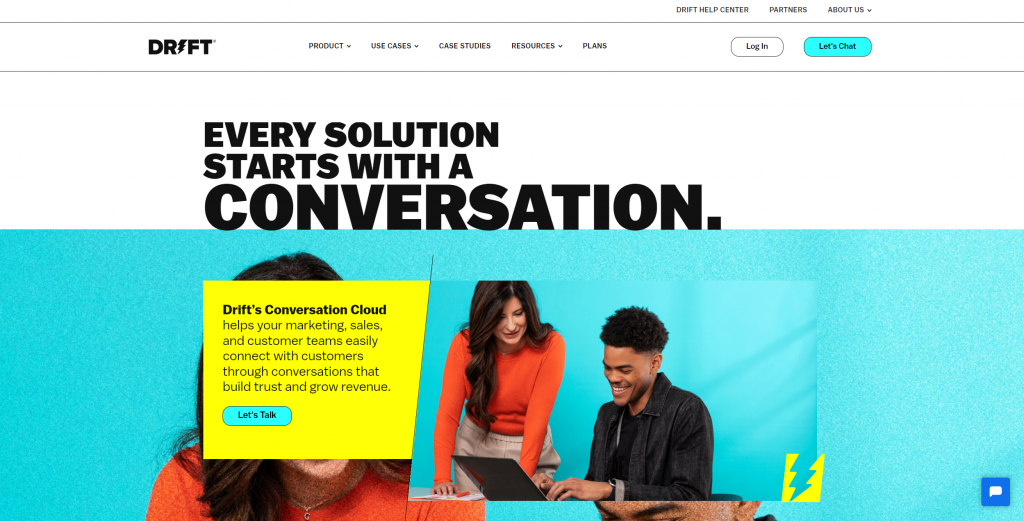
Do your conversations with customers feel more robotic than real? With Drift, put an end to robotic conversations and start engaging conversations that make customers feel special.
Drift is a conversational AI chatbot that knows exactly how to interact with customers in real-time and deliver remarkable, tailored conversations with incredible results. Using natural language processing (NLP) to interact with customers means that you can let go of generic messages and truly connect. Plus, you can rest assured knowing that CMOs are in control, as Drift provides granular reporting for key metrics tracking.
Integrating your tech stack with Drift is a breeze. The platform has an array of integrated platforms, like Salesforce, Clearbit, and Salesloft. Drift also syncs perfectly with Zapier, allowing you to put your tech stack on autopilot and connect with thousands of apps.
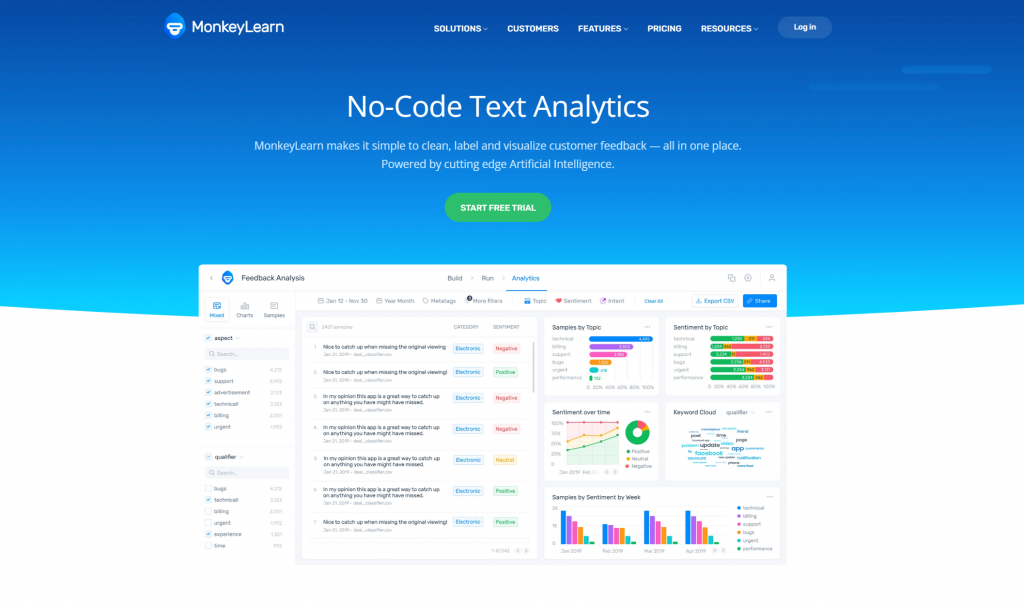
Making sense of unstructured data just got easier – and it’s all thanks to MonkeyLearn! This amazing NLP tool makes it easy to take in large amounts of customer feedback and quickly analyze and classify it, so you can gain invaluable insights into customer sentiment, identify trends, and more.
What exactly is it? MonkeyLearn is an AI-driven platform that automates text analysis processes to help you make the most of customer reviews, social media comments, and other forms of feedback. Upload your data and you can access instant visualizations and actionable insights.
The truly remarkable thing: MonkeyLearn allows users to view customer feedback all in the same place and access pre-built machine learning models for speedy analysis. If you need something a bit more specific, MonkeyLearn also offers a no code option that lets you build and train custom machine learning models.
MonkeyLearn integrates with a variety of customer service tools (such as Zendesk and HelpScot) and survey platforms (Typeform and Qualtrics, to name just a few). If your preferred tool isn’t in the library, no need to worry – you can access more integrations via Zapier.
AI Tools for Lead Nurturing and Conversion Tracking
We’re living in an age where AI is changing the game and revolutionizing the way we do business. These AI tools can be a game-changer, helping businesses nurture leads, deliver tailored experiences and track conversions with accuracy. Make the most of AI capabilities, and your lead nurturing processes, conversion rates, and overall marketing and sale results will get a seriously impressive boost.
It’s not a case of ‘if you don’t use AI’ – it’s a case of ‘when are you going to join the AI party?’
Here are some AI-powered tools that can assist in lead nurturing and conversion tracking:
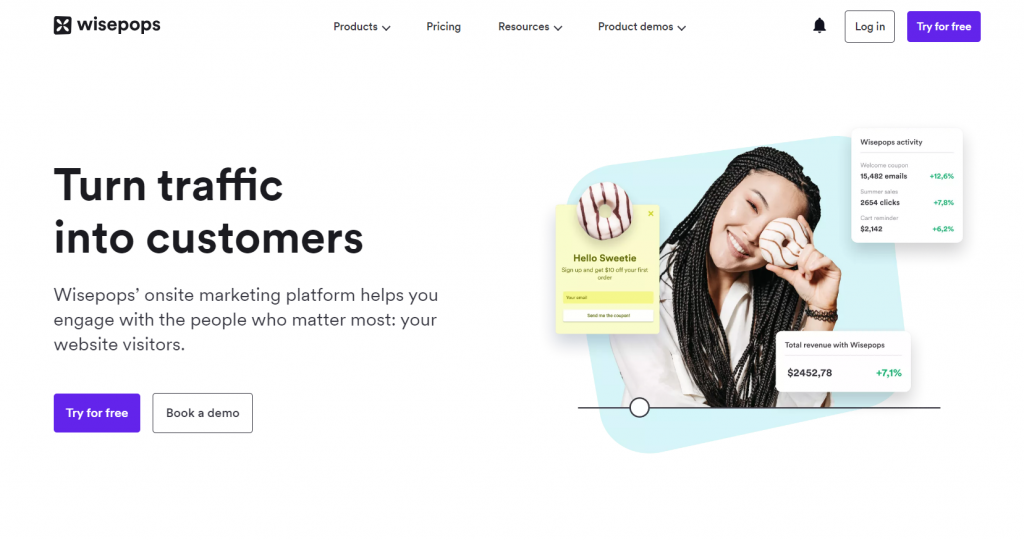
Wisepops just might be the ultimate onsite marketing platform to help you take your lead generation efforts to the next level. Offering you the ability to craft custom popups, bars, embedded signup forms, and onsite notifications targeted for specific visitors based on their location, behavior, or referral source, it’s an unbeatable toolkit for digital marketers looking for a creative edge.
For B2C businesses, Wisepops is a great platform for offering discounts, free shipping, and other incentives to convert traffic. And B2B websites can benefit from everything from newsletter subscribers to free trial signups. With custom rules and triggers to maximize your click-through rate, you won’t find a stronger tool for lead generation success.
If you’re ready to take your digital marketing game up a notch, then Wisepops is your go-to solution. Start today and see just how powerful onsite marketing can be!
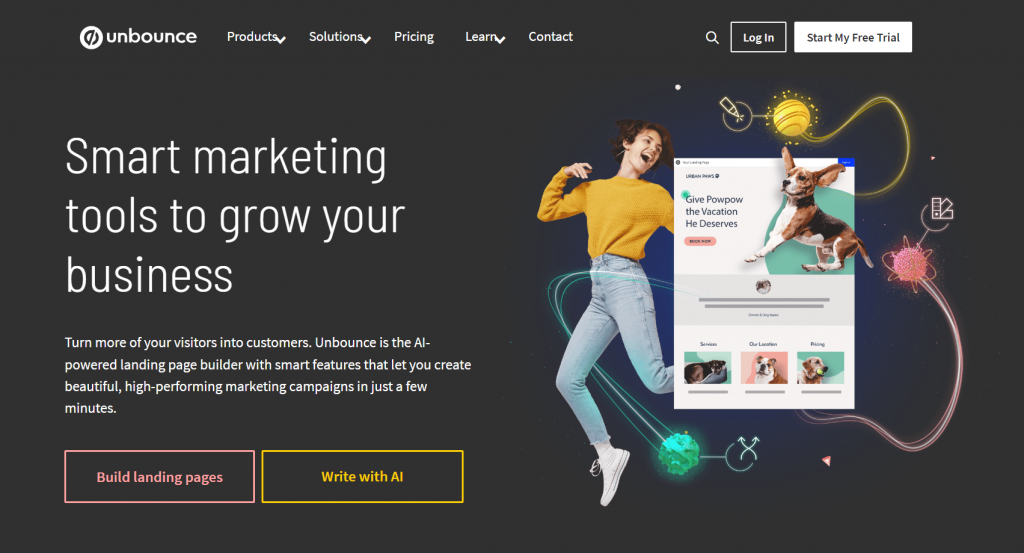
Ready to rock your online marketing game? Unbounce is here to help! With zero coding experience required, Unbounce provides the tools to create stunning landing pages designed with conversions in mind. Not only that – with Unbounce, you can create custom landing pages for different marketing campaigns like PPC ads or social media campaigns. Plus, it easily integrates with solutions like HubSpot and Marketo for automated flows for lead generation and lead scoring.
Unbounce’s key features include a drag-and-drop landing page creator, A/B testing and conversion-focused templates, dynamic text replacement for personalization, and lead capture forms. It’s the perfect landing page solution for businesses of any size looking to bolster their lead generation and conversion rates.
Artificial Intelligence for Automation and Efficiency
Let’s take a look at what AI and RPA can do for businesses looking for a modern edge in automation. With AI-powered robotic process automation (RPA) tools, like Automation Anywhere and UiPath, companies can now automate mundane tasks and processes with unprecedented efficiency. Going beyond just data entry and customer service; RPA can free up valuable time for more high-value tasks and activities. Plus, AI-powered intelligent document processing takes automation capabilities to the next level. Businesses can now use this remarkable technology to extract data from unstructured documents like invoices and contracts with confidence and accuracy. In short, AI and RPA offer businesses a vibrant new way to streamline workflows and optimize operations.
Another area where AI is making a big impact is in predictive maintenance. By analyzing data from sensors and other sources, AI tools can predict when equipment is likely to fail and take proactive measures to prevent downtime. This can be particularly valuable for businesses in industries like manufacturing and logistics, where downtime can be costly and disruptive. In addition to predictive maintenance, AI is also being used to optimize supply chain operations, with tools like IBM’s Watson Supply Chain Optimization using machine learning to analyze data and identify opportunities for improvement.
AI is also transforming customer service, with chatbots and virtual assistants becoming increasingly common. These tools use natural language processing (NLP) and other AI technologies to understand customer inquiries and provide relevant responses. This not only saves time and resources but can also improve the customer experience by providing faster, more personalized service.
Finally, AI is being used to enhance decision-making across a wide range of industries. With the help of machine learning algorithms and predictive analytics tools, businesses can analyze vast amounts of data to identify patterns and trends, and make predictions about future outcomes. This can be particularly valuable in industries like finance and healthcare, where accurate predictions can have a significant impact on business outcomes.
While the benefits of AI for automation and efficiency are clear, there are also potential risks to consider. For example, there are concerns about the impact of AI on jobs, with some experts predicting that automation could lead to significant job losses in certain industries. Additionally, there are concerns about the ethical implications of AI, particularly when it comes to issues like privacy and bias.
With its endless possibilities for automation and efficiency, embracing the power of AI is sure to give businesses a serious edge over their competitors. After all, when it comes to the future of business success, AI is undoubtedly the way to go.
Conclusion
Brain outsourcing through the use of AI tools and technologies is transforming the way businesses approach marketing work. By automating repetitive tasks, streamlining workflows, and providing valuable insights and intelligence, AI is helping businesses to improve efficiency, reduce costs, and drive better results.
From automated content creation and social media management to lead nurturing and conversion tracking, AI is providing new opportunities for businesses to optimize their marketing efforts and build better relationships with customers.
However, it’s important to remember that while AI has the potential to revolutionize marketing work, it’s not a silver bullet. Businesses must still invest in the right people, processes, and technologies to ensure that they are getting the most out of their AI tools.
Additionally, businesses must be mindful of the potential risks associated with AI, including job displacement and ethical concerns. Nonetheless, the benefits of brain outsourcing through AI are clear, and businesses that embrace this technology are likely to be more competitive and successful in the years to come.






